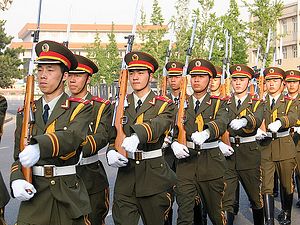The suicide bomb attack on the Chinese embassy in Kyrgyzstan in August 2016 highlighted China’s rising external vulnerability in a region at the heart of its signature foreign policy project, the Belt and Road Initiative (BRI). For the first time, attackers with alleged ties to militant groups in Syria targeted a Chinese mission in Central Asia. This event will speed up the development of a more pronounced Chinese security posture in the region and beyond.
While such external events generate immediate attention and force the Chinese leadership to react, the BRI has more important long-term internal effects on the development of China’s global security posture: it helps to channel and focus domestic security debates by providing a reference point and creating a context for concrete policy actions.
Anticipating and responding to increasing global vulnerability, the Chinese leadership has more forcefully set out to define China’s role as a global security actor since 2014. While the BRI’s potential economic impact has been widely discussed, international observers underestimate its role in the globalization of China’s national security policy. The latest “Strategic Review” issued by the Chinese Academy of Military Science underlines that it plays a vital role: “The Belt and Road construction provides not only the overseas space for China’s national interests’ expansion but also a practice model for overseas interest maintaining.”
Beyond potential implications for the global balance of power and the BRI’s crucial role in stabilizing China’s border region in Xinjiang, Chinese security experts are intensively discussing the detrimental impact a fragile security environment in host countries will have for implementing BRI projects. The security policy community’s discussions of BRI also hint, however, at a larger foreign policy shift. Wang Weixing from China’s National Defense University, for example, frames the Belt and Road not only as a development strategy but also as a national security strategy. Arguing that Belt and Road projects require military protection, Wang pushes for military force development and force projection abroad.
Chinese security policy experts use potential threats to BRI projects to highlight the necessity of a globalized security posture. Claiming that the BRI turns the protection of Chinese overseas interests into an immediate concern, they urge policymakers to overcome their former reluctance to formulate a more outward-looking security policy for China.
The most important threats identified by the Chinese security policy community are terrorism, great powers’ geopolitics and instability caused by domestic transformation. Other threats include piracy, organized crime, climate change and natural disasters. While China’s security policy experts are rapidly stepping up efforts to grasp the situation on the ground in risk-prone regions, especially in South East Asia, Central Asia and the Middle East, they also argue that in its new role as a global security actor, China will have to engage in expeditionary military activities. In this context, analysts like Zhu Chenghu from National Defense University call for a continuous geographic expansion of the Chinese military’s external activities from its neighborhood to more distant regions.
In countering the above-mentioned new threats, scholars such as Zhao Kejin and Li Shaojie from Tsinghua University also call for deepening the cooperation between Chinese private security companies and government actors. To make this possible, they suggest changes to the legal framework to allow Chinese security firms to expand their activities overseas.
Zhao Mingyao, who works for the CCP’s International Department, wants the Chinese government to call upon host governments to share the risks linked to BRI projects. In order to avoid that China becomes the sole provider of security, he suggests pushing host countries’ governments to extend security guarantees to BRI projects.
In addressing terrorism, analysts like Zhang Weipeng from the Chongqing Party School call for stepping up counterterrorism cooperation, especially with Middle Eastern governments. Most importantly, he suggests to improve intelligence gathering and to control the spreading of extremist ideas. According to him, a practical step forward would be to establish information sharing platforms with Middle Eastern countries and international organizations.
Some of these suggestions have already materialized on the ground. Pakistan’s army, for instance, is already heavily engaged in protecting Chinese nationals and assets in BRI-related projects. A new army division with an estimated 13,000 troops was created to protect the China-Pakistan Economic Corridor. In Central Asia, efforts to step up counterterrorism activities recently materialized in a quadrilateral cooperation and coordination mechanism between the militaries of Tajikistan, Afghanistan, China and Pakistan.
The globalization of China’s national security policy is still very much in the making and subject to many constraints, including the gap between the increasingly ambitious top-level narrative and the more profane task of developing solid risk assessments as well as concrete and flexible security policies adapted to local contexts in the prospective host countries of BRI projects.
China’s future role as a global security actor will also depend on external factors such as events that put pressure on the Chinese government or opportunities for cooperation with other international actors. Domestically, the BRI plans and their gradual implementation facilitate the formulation of an outward-oriented national security policy – a shift with far-reaching implications for China and the rest of the world.
Sabine Mokry is a research associate at Mercator Institute for China Studies (MERICS). Her research focuses on the domestic sources of China’s foreign and security policy as well as on Chinese activities on the African continent.

































